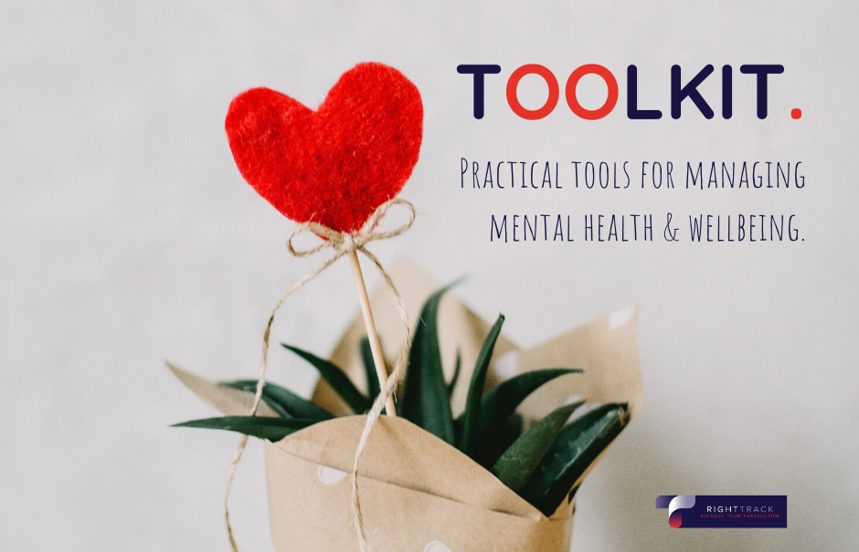There are some really unhelpful stereotypes and taboos out there surrounding ‘Mental Health’ and ‘Wellbeing’. And because of the way our brains work, we can be more influenced by them than we might think.
This activity can be used as a self-reflection tool, or by managers with their teams to start dialogue about this important, but sometimes difficult, topic.
(Look out for the link in each section to download the worksheet. And if you’d like more tools like this, download our Mental Health & Wellbeing Toolkit for eight additional activities.)
Let’s Start with a 7 Question Quiz
Download the worksheet and circle the answers that best apply to you, or note ‘A’ or ‘B’ down on a piece of paper. Don’t think about your answers too much, just go with your gut response
1. If your manager asked how you were, and you were in a bad place, would you say anything?
A: Yes
B: No
2. If someone at work started talking about mental health, would you readily share your experiences?
A: Yes
B: No
3. If a colleague mentioned they were depressed, would you:
A: Ask what you could do to help to make things a bit easier for them at work
B: Think nothing of it – they are probably just having an off day
4. Do you believe your manager would be supportive if you shared with them that you were struggling with mental ill-health?
A: Yes
B: No
5. What do you think about meditation?
A: I have / or would be open to trying it
B: Not for me
6. Do you view mental ill-health as a valid reason to take a day off work, like having flu for example?
A: Yes
B: No
7. If someone shares their emotions in the workplace do you:
A: Think it’s a good thing
B: Prefer it if they didn’t
Are You Influenced by Stereotypes & Taboos?
The more Bs you answered the more you’re likely to be – consciously or sub-consciously – influenced by mental health stereotypes and taboos. This may be as a result of personal experiences, how you were brought up, the community you live in, the environment you work in, and the micro-messages that are reinforced around you.
Where you answered B, read the explanations below and reflect on your reasons for choosing B. Upon reflection, would you change your mind? (Download the worksheet for use with your team.)

Breaking Mental Health & Wellbeing Taboos
1. If your manager asked how you were, and you were in a bad place, would you say anything?
Lots of us say we are fine when we aren’t, after all, who wants to hare their inner most demons with everyone who asks. However, if you are keeping your feelings to yourself because ‘mental health taboos’ make you feel you should hide how you are feeling, then scrap that and do what helps you. If letting your line manager, or colleagues, know how you’re feeling means they might cut you some slack whilst you get yourself back on track, you should definitely have an honest, open conversation.
2. If someone at work started talking about mental health, would you readily share your experiences?
Many of us stay silent because we feel we might be judged if we share our experiences about mental health issues. And, you know what, you’re right. Everything we are exploring on this page is about society’s pre-conceptions, assumptions and judgements. But, until we start talking about mental ill health as freely as we would our physical ill health, nothing will ever change. If you have experiences you can share: don’t be embarrassed, be brave.
3. If a colleague mentioned they were depressed, would you:
Be careful about fobbing people off with light-hearted “man-up” or “it’s all a state of mind” type remarks. Certainly, there will be times when “I’m depressed” really means “I’m having a seriously crappy week”. Other times people are genuinely trying to share where they are at and, if they are in a dark place, “pull yourself together” is not going to help. Listen. Find out more. Respond with empathy.
4. Do you believe your manager would be supportive if you shared with them that you were struggling with mental ill-health?
We’ve all made up stories in our head about how a conversation might pan out (and the scenarios we play out in our minds are often much less optimistic when we’re not feeling top of the world!) But remember this: firstly employers have a duty of care and are obliged to make reasonable adjustments to support you; but secondly, and most importantly, why would your manager wish anything but for you to be top of your game. More likely than not, your manager will have noticed you’ve not been yourself and will be grateful to understand why, and how to support you.
5. What do you think about meditation?
Meditation comes with a great number of stereotypes! It also comes with bundles of research proving its positive impact on body and mind. Stop for a minute and ask yourself whether you’re blocking meditation because you’ve tried it and it didn’t work for you, or because you don’t like the stereotypes that society has created around it. If it’s good for Arnold
Schwarzenegger, Cameron Diaz, Will Smith, Bill Gates, Hugh Jackman, Lady Gaga, Michael Jordan and Clint Eastwood…. to name just a few(!!)…. then maybe it could be good for you too?
(Whilst meditation might seem a bit intense to start off with, why not commit to just 3 minutes a day for the next 3 days to sit somewhere quiet, with your eyes closed, focusing on slow and deep breaths in, and out. Or download one of the apps like Headspace that guide your through one step at a time.)
6. Do you view mental ill-health as a valid reason to take a day off work, like having flu for example?
A number of surveys over recent years have found that no less than 50% of us will make up a physical illness as an excuse for a mental health sick day which proves that we still have a long way to go to break down taboos. If you haven’t experienced deep depression or debilitating anxiety it will be hard to understand how it feels but if someone needed a few days off to get themselves strong again after breaking a bone, or having flu, you wouldn’t begrudge them that. Why should it be different for mental ill-health? If you haven’t experienced mental ill-health yourself and don’t understand why someone would need to take time off work, when you next get the opportunity, sensitively inquire into how it feels for someone who has so you can understand better.
7. If someone shares their emotions in the workplace do you:
Talking about your emotions has been a taboo across many communities for generations. Thankfully, we are making great steps towards it being acceptable to say “you know what, I don’t feel ok today.” And what a relief it can be to have the opportunity to share that at times. But many people experience big feelings of discomfort when talking about their feelings, or
listening to others do the same. But for what reason? Who said we can’t share how we feel? Might there actually be a positive effect on our mental wellbeing if we can voice how we feel and share the load with others?
Download More Tools
If you’d like more tools like this, download our Mental Health & Wellbeing Toolkit .
